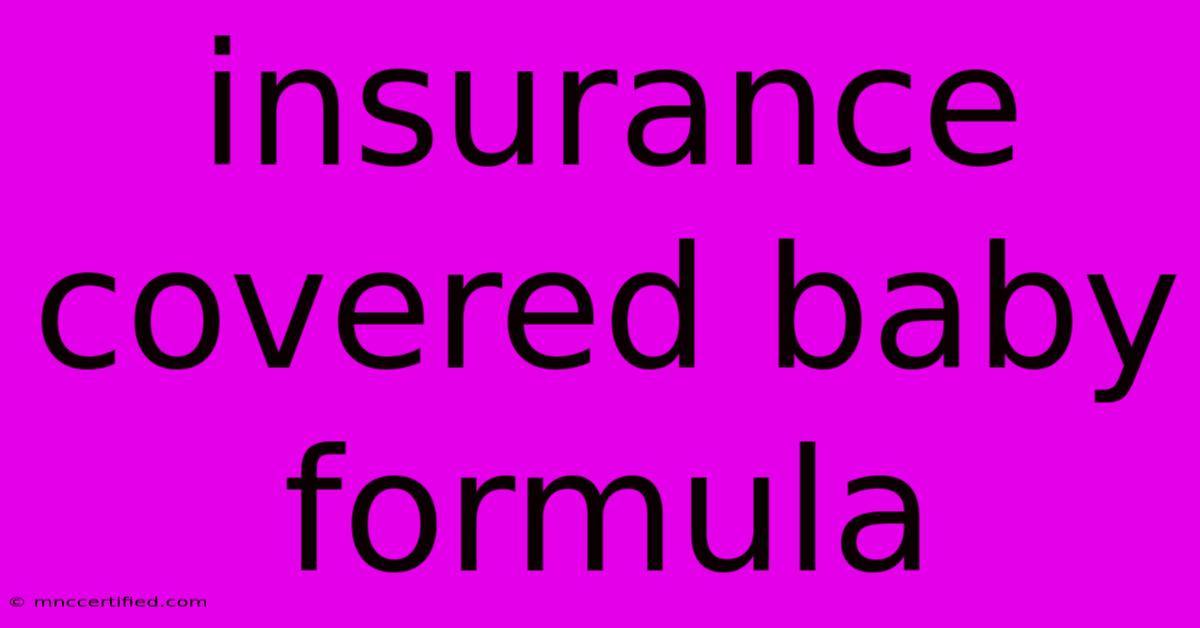Insurance Covered Baby Formula

Table of Contents
Insurance Coverage for Baby Formula: A Comprehensive Guide
Finding the right baby formula can be stressful enough for new parents, but navigating insurance coverage adds another layer of complexity. This comprehensive guide will break down everything you need to know about insurance coverage for baby formula, helping you understand your options and maximize your benefits.
Understanding Your Insurance Plan
The first step is understanding your specific health insurance plan. Not all insurance plans cover baby formula, and coverage varies significantly between providers. Some plans may offer partial coverage, while others might cover formula only under specific circumstances.
- Check your policy documents: Carefully review your policy's summary of benefits and coverage (SBC) and plan documents. Look for keywords like "infant formula," "nutrition," or "baby supplies." The details of what's covered and the reimbursement process should be outlined there.
- Contact your insurance provider directly: If you're struggling to decipher your policy, call your insurance company's customer service line. They can clarify your coverage specifics, including any pre-authorization requirements, formularies (lists of covered formulas), and reimbursement procedures.
- Understand your deductible and copay: Even with coverage, you'll likely have a deductible and copay. Knowing these amounts beforehand will help you budget for out-of-pocket expenses.
What Factors Influence Coverage?
Several factors can influence whether your insurance covers baby formula:
- Type of insurance: Medicaid and CHIP (Children's Health Insurance Program) often have more generous coverage for baby formula than private insurance plans.
- Medical necessity: Some plans may only cover formula if a doctor prescribes it due to a medical necessity, such as allergies or inability to breastfeed. Documentation from your pediatrician is crucial in these cases.
- Specific brands and types: Many plans have formularies listing covered formulas. You may be limited to specific brands or types, even if your doctor recommends a different option.
- Pre-authorization: Some plans require pre-authorization before covering formula. This means you need to get approval from your insurance company before purchasing the formula. Failure to do so could result in denied claims.
Exploring Options for Formula Coverage
If your insurance doesn't cover formula, or its coverage is insufficient, several alternative options exist:
- WIC Program: The Special Supplemental Nutrition Program for Women, Infants, and Children (WIC) provides federal grants to states for supplemental foods, healthcare referrals, and nutrition education for low-income pregnant, breastfeeding, and postpartum women, infants, and children up to age five. WIC benefits can significantly reduce the cost of formula. Eligibility requirements vary by state.
- Manufacturer coupons and rebates: Formula manufacturers frequently offer coupons and rebates to reduce the cost of their products. Check their websites or use coupon apps to find savings.
- Local food banks and charities: Many local organizations provide food assistance, including baby formula, to families in need. Contact your local food bank or search online for charitable organizations in your area.
- Negotiating with your provider: If you're facing significant financial hardship, consider discussing your situation with your insurance provider or doctor. They may be able to assist you in accessing financial aid programs or finding alternative solutions.
Maximizing Your Insurance Benefits for Baby Formula
To ensure you receive the maximum benefits possible:
- Keep accurate records: Keep all receipts, prescriptions, and insurance claim documentation. This will be crucial if you need to appeal a denied claim.
- Understand the claims process: Familiarize yourself with your insurance company's claims process. Submitting claims promptly and accurately can minimize processing delays.
- Appeal denied claims: If your claim is denied, understand your rights to appeal. Follow your insurance provider's appeal process carefully and provide all necessary supporting documentation.
- Explore alternative formulas: If your insurance doesn't cover your preferred formula, explore other options on the formulary to minimize out-of-pocket costs.
Navigating insurance coverage for baby formula can be challenging, but with careful planning and attention to detail, you can maximize your benefits and ensure your baby has the nutrition they need. Remember to always check your policy, contact your insurance provider directly, and explore additional resources if needed.

Thank you for visiting our website wich cover about Insurance Covered Baby Formula. We hope the information provided has been useful to you. Feel free to contact us if you have any questions or need further assistance. See you next time and dont miss to bookmark.
Featured Posts
-
Mack Brown Fired Unc Parts Ways
Nov 27, 2024
-
Egypt Tourist Boat Latest Rescues
Nov 27, 2024
-
Del Toro Insurance Cerca De Mi
Nov 27, 2024
-
New Su Rvers Join Vanderpump Rules Season 12
Nov 27, 2024
-
Sporting Cp Vs Arsenal Live Stream Guide
Nov 27, 2024